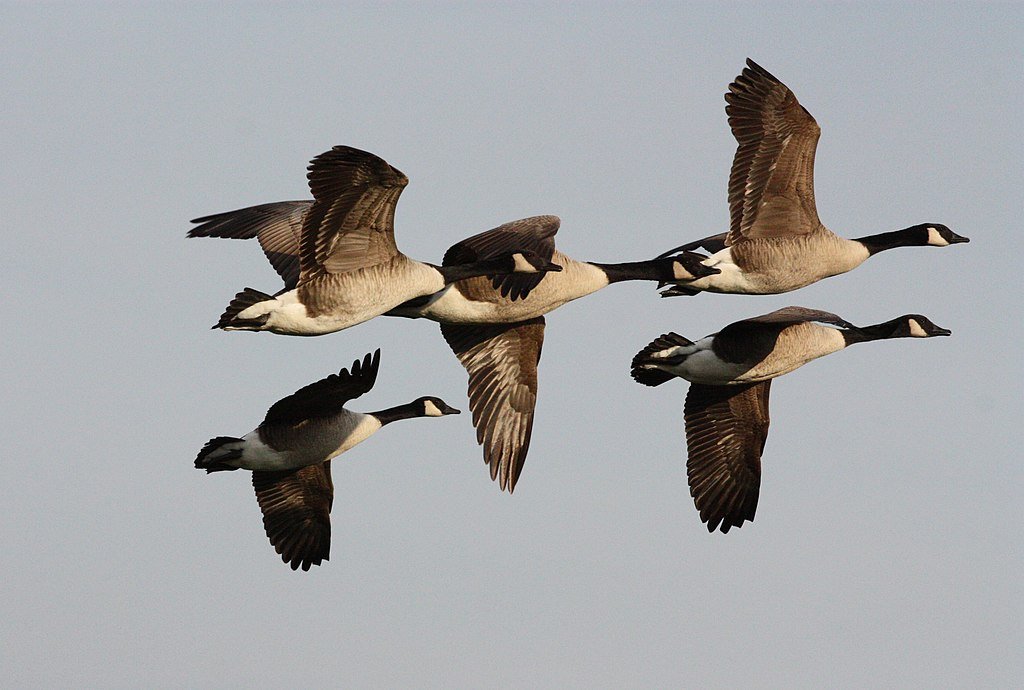12 September 2022
A wild goose chase is a fruitless quest, one where the objective is unlikely or impossible to be achieved. But why a wild goose?
The phrase originally comes from horsemanship, referring to a type of race where the riders must try to overtake the leader, who twists and turns in an attempt to shake the following riders. The imagery evoked is that of a flock of wild geese, which follow the lead bird. We see this horsemanship sense in Gervase Markham’s 1593 treatise on the subject:
Wherefore séeing that your speede fayles, then loyter after, and keepe your Horse as fresh as you can, that comming to the Wild-goose chase, taking the leading, sée if with slyppes and turnes you can foyle him that rydes against you. In which slyppes, the cunning of the Horseman must as much auayle as the goodnes of the horse: and for that those slyppes shew both a ready Horse, and an artificiall Ryder, I will teache you héere how to doo them.
And again, we see it in Gerard Langbaine’s 1685, The Hunter:
The Wildgoose Chase received its Name from the manner of the flight which is made by Wildgeese, which is generally one after another: so the two Horses after the running of Twelvescore Yards, had liberty, which Horse soever could get the leading, to ride what ground he pleas’d; the hindmost Horse being bound to follow him, within a certain distance agreed on by Articles, or else to be whipt up by the Triers or Iudges which rode by, and which ever Horse could distance the other won the Match.
But the term was cemented into the language when it was used by Shakespeare in Romeo and Juliet. It is uttered by Mercutio when he is speaking to Romeo in the midst of the pair trading verbal jibes. As such, Shakespeare is using wild goose chase outside the original context of horsemanship and applying it to the twists and turns of witty discourse. The following quotation demonstrates how it appears in the first quarto edition of 1597. The quarto text isn’t divided into acts and scenes, but in most modern editions, these lines are in Act 2, Scene 4:
Nay if thy wits runne the wildgoose chase, I haue done: for I am sure thou hast more of the goose in one of thy wits than I have in al my fiue: Was I with you there for the goose?
There are numerous extant instances of such figurative use of wild goose chase in the years that immediately follow, so we can be pretty sure that the usage was common at the time and that Shakespeare did not invent it, even if his is the first published use of the figurative sense that we have today. For instance, there is this passage about faulty theological argument from John Deacon’s 1601 Dialogicall Discourses of Spirits and Divels:
Your manner of disputing, is very like (I perceiue) to a maultmilne horse his manner of drawing. For he (being blindfolded before he be put in his geares) knoweth none other, but that he goeth directly forewards: when notwithstanding, he keepeth onely a circuler motion: so surely, your selfe (beeing horribly hood-winked herein with the palpable maske, of a mischeiuous selfe-conceite) you do verely suppose, that (in this your giddie course of disputing) you goe directly an end, when you follow eftsoones the wild-goose chase: one while fleeing from scripture to common experience, and (beeing soone weary of your part that way) another while retiring from common experience to the scriptures againe, as one that wotteth not well, in what place to fasten his foote.
Still, while it’s unlikely that Shakespeare coined this sense, it is likely that the phrase would have been forgotten long ago if it had not appeared in his corpus.
Over time, however, the original horsemanship sense faded from use and became forgotten. This opened the phrase up for re-analysis, and the wild goose was understood to refer to an object that could not be caught or achieved. We see this reworking of the metaphor in Samuel Johnson’s 1755 dictionary:
WILDGO´OSECHASE, n. s. A pursuit of something as unlikely to be caught as the wildgoose.
Sources:
Deacon, John. Dialogicall Discourses of Spirits and Divels. London: George Bishop, 1601, 221–22. Early English Books Online (EEBO).
Johnson, Samuel. A Dictionary of the English Language, vol. 2 of 2. London: W. Strahan, 1755, s.v. wildgoosechase, n. Octavo digital edition, 2005, disc 3.
Langbaine, Gerard. The Hunter. A Discourse on Horsemanship. Oxford: L. Lichfield for Nicholas Cox, 1685, 72. Early English Books Online (EEBO).
Markham, Gervase. A Discource on Horsmanshippe. London: I. Charlewood for Richard Smith, 1593, sig. H4v. Early English Books Online (EEBO).
Oxford English Dictionary, second edition, 1989, s.v. wild goose chase, n.
Shakespeare, William. An Excellent Conceited Tragedie of Romeo and Juliet. London: John Danter, 1597, sig. E2r. Early English Books Online (EEBO).
Tréguer, Pascal. “Original Meaning and Sense Development of ‘Wild-Goose Chase.’” Wordhistories.net. 8 October 2018.
Photo credit: Dominique Hoekman, 2016. Licensed under a Creative Commons Attribution-Share Alike 4.0 International license.

